Every good brand knows consumer trust and loyalty can’t be bought or won through snazzy marketing—it’s something that you earn. While it’s relatively simple to win sales through promotions or rewards, getting someone to truly believe and get behind your brand requires a deeper and more genuine connection.
This is why brands are starting to focus on authentic marketing.
When you market your brand in ways that feel relatable and real to your target audience, you not only win more sales, you gain loyal patrons who are proud to align themselves with your company.
In this guide, we’ll take a look at the steps you should take to convey legitimacy through authentic marketing. Read through the insights below and see how you can apply them to your strategy:
Why the Rise in Authentic Marketing?
Before diving into specific steps, let’s first take a look at why authenticity marketing is so important:
- Consumers are inundated with messages. With the sheer amount of marketing and advertising out there, people have learned to tune out messages they can’t relate to. Authenticity marketing lets you cut through the noise and stand out to your target audiences.
- People’s ‘BS detectors’ are stronger than ever. Modern consumers can smell deceitful marketing from a mile away. As Josh Braaten, CEO of Brandish Insights, a brand measurement and consumer insights company, puts it, “with all the fake news out there today, consumers are getting more discerning than ever and have less patience for anyone who is stretching the truth or trying to deceive them.”
- Consumers are more conscious of brand values. Implementing authenticity marketing will help you express brand values and purpose. And since many consumers (younger ones in particular) are more inclined to align themselves with businesses that share their values, authenticity marketing puts you in a position to win over the right customers.
How to Convey Brand Authenticity & Earn Consumer Trust
Now that we’ve discussed why brand authenticity is necessary, let’s dive into the ways that you can implement authenticity marketing.
Get Clear on Your Values
As previously mentioned, part of being authentic means promoting your values and purpose. To do that successfully, you first need to identify what your business stands for and use it to guide your marketing efforts.
“The first thing a retailer needs to figure out is the ‘why’ of their product or business,” said Lisa Cox, a San Francisco-based brand strategist and designer. “Why does their business exist and why does it matter? I see companies try to portray what they think will come across as authentic, but consumers can see when there is nothing there to back it up.”
https://www.instagram.com/p/BsgXbimnDNR/
Cox believes the best way to get your values across is to tell the story of your business and do it in a genuine way. The company story is one of the best things brands have to work with to be more honest and authentic.
“You can’t fake authenticity so go all in and be vulnerable,” said Cox. “Share the actual reason you started your business like you are talking to a friend.”
Once you’ve gotten clear on your values, purpose and story, find ways to spread the word. Look at your marketing channels and other assets. Then use them to promote your brand’s ideals and narrative.
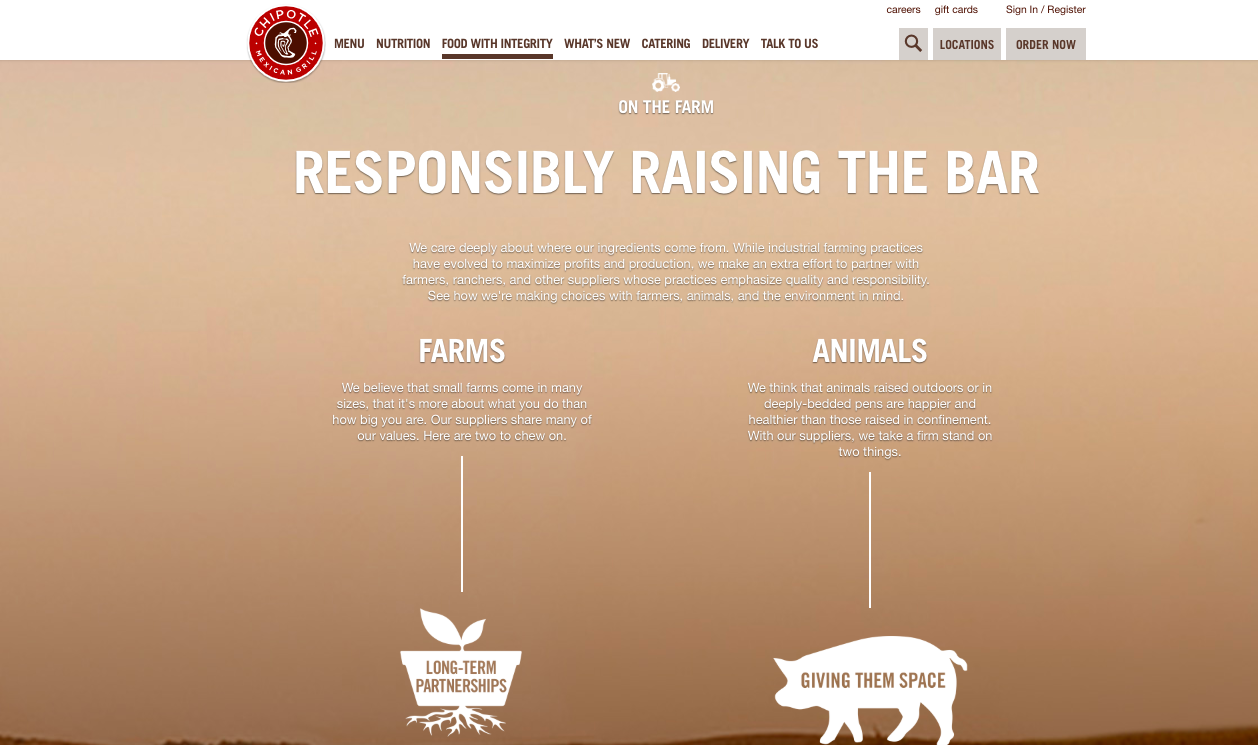
Chipotle does an excellent job here. The company is committed to serving food that’s sourced from the best ingredients and crafted through ethical means. Aside from stating this on their website, Chipotle reinforces its brand values on its packaging and in-store signage.
https://www.instagram.com/p/BoMul2KD-WS/
Be Transparent
Being transparent is the ultimate display of authenticity. Giving people a look at how you actually run your business or create your products adds credibility to your brand and encourages sales and loyalty.
Here are some of the ways to inject more transparency in your marketing:
Be Open About Your Products
Give people more insights into how your products are made. What goes into each item? How much does it cost to create your merchandise? If you’re able to answer these questions honestly, you’ll set yourself apart from the majority of businesses who keep these things hush-hush.
Everlane is a prime example of a retailer that does this. One of the company’s core beliefs is “radical transparency.” To show consumers that they’re committed to it, Everlane publicly displays the “true cost of its merchandise” on its website.
Every product page has a “Transparent Pricing” section that breaks down the costs that go into creating each item, so shoppers know exactly what they’re paying for.
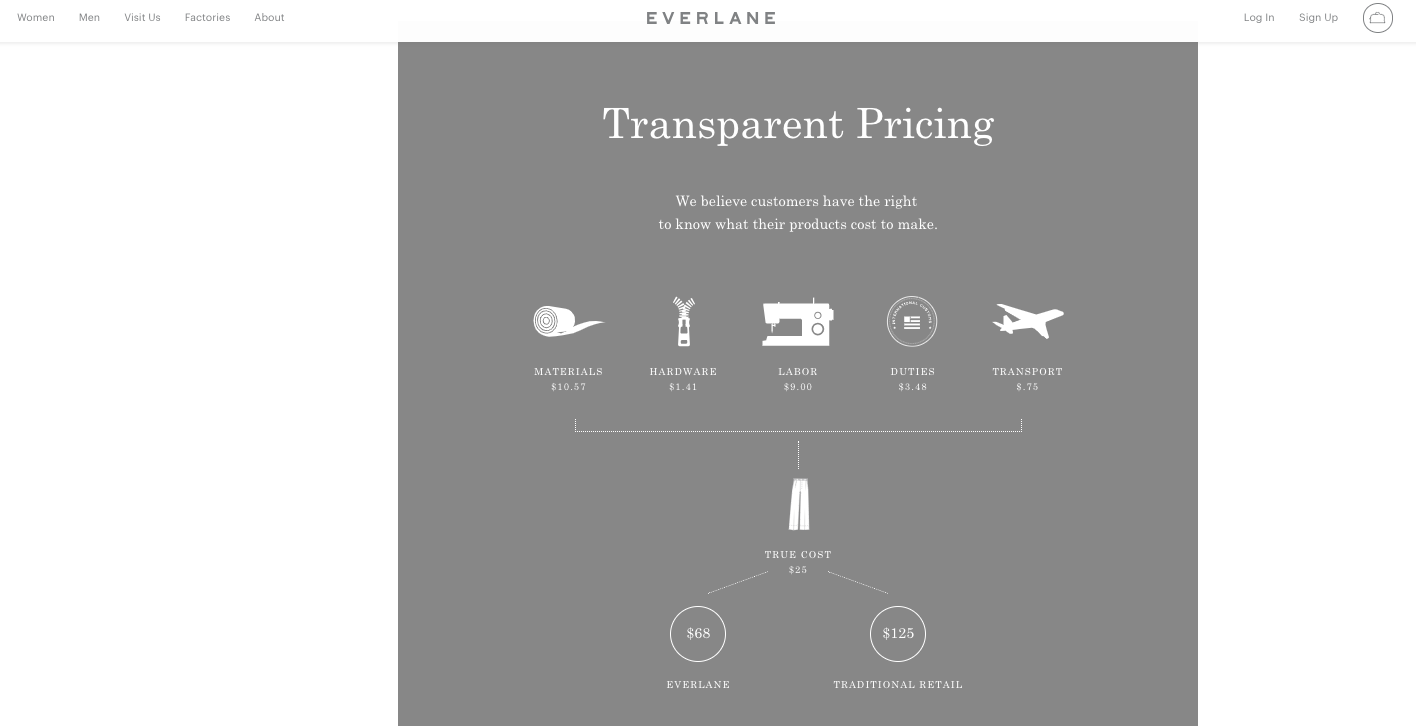
Pull Back the Curtain on Your Operations
Give people a behind-the-scenes look at your business. Introduce customers to the people running your operations and offer a glimpse into your processes and business activities.
Showing customers that your behind-the-scenes actions reflect your public your image earns their trust and confidence in your brand. Customers don’t trust brands unless they can truly promote themselves as ‘one of you,” which requires effort on your part.
Reformation, an apparel retailer that focuses on sustainable fashion, did this in 2018 when it posted several Instagram stories showing its factory operations. Reformation even encouraged its followers to ask questions via Instagram and publicly answered those questions in its stories.
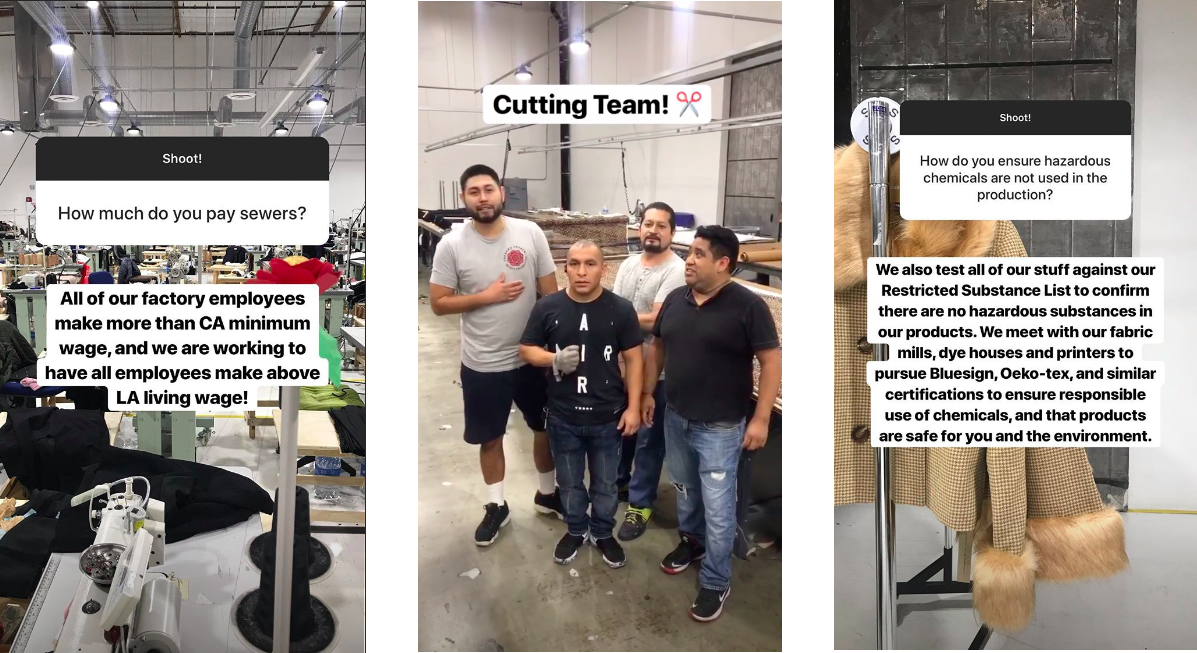
Level Up Your FAQ Game
Speaking of which, FAQ pages are great, but the questions and answers displayed on these pages often feel canned and rehearsed. Take things to the next level and add a layer of authenticity to your FAQs. Do this by letting visitors submit questions you can publicly answer on your website.
This works best for specific product pages, where you can address item-specific questions. Genuine FAQs don’t just contribute to your brand’s authenticity, they also help shoppers make more informed decisions.
Otterbox provides an excellent example of product page FAQs done right. All of its product pages have an FAQ tab which displays user-submitted questions along with candid answers from the Otterbox team.
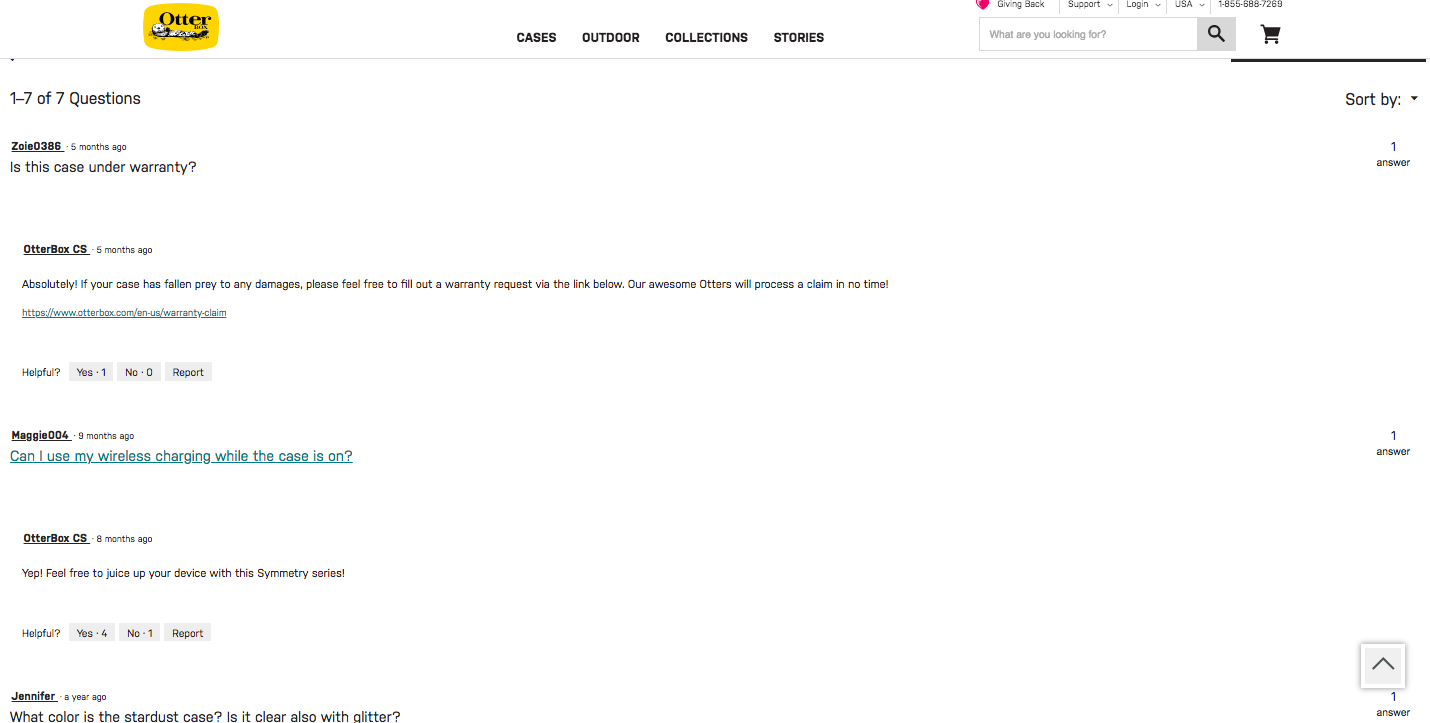
Employ People Who Naturally Embody Your Brand
The people who work for you play a huge role in promoting your brand, so strive to hire employees who possess the right attitudes. For example, if you’re an outdoorsy brand whose mission is to protect Mother Nature, then you’ll want to employ people who share the same passion for safeguarding the environment.
A good tip to follow is to hire for attitude and train for skill. Recognize that while you can teach people how to sell or to follow your company policies, it’s much harder to change someone’s values and disposition.
Some of the world’s top companies are known for doing this and ultimately creating a more authentic marketing play toward their hiring methods. Trader Joe’s, which is famous for its quirky and friendly brand, hires people who are naturally outgoing and who like to talk to others.
Mark Gardiner, author of Build a Brand Like Trader Joe’s, went through the company’s training program when he applied for a position at the grocery store. Here’s how he described his experience:
“[The] profound thing that happened after realizing, wow, these people are really not a random group of people. These people are all naturally empathetic…they want to listen to other people talking about themselves, they want to have conversations with other people.”
https://www.instagram.com/p/BkRKzODjFp8/
Who You Hire Says a Lot About Your Authenticity
Disney has a similar hiring strategy. The company pays a lot of attention to the details when hiring, so they recruit specifically toward people who fit their culture.
Both Trader Joe’s and Disney are known for having amazing employees who provide memorable customer experiences in line with the company’s image. Follow their lead when you’re recruiting your own team.
https://www.instagram.com/p/Bsq_NwLh7L8/
Your efforts in authenticity marketing will be futile if your employee attitudes aren’t consistent with the values you want to promote. So it’s always smart to try and stick to hiring individuals who naturally embody your brand.
Stop Sugarcoating Everything
While your marketing and advertising initiatives should position your company in the best light, being overly polished or glammed up can convey inauthenticity. This could easily prevent customers from being able to relate to you.
Every now and then, it helps to be a little vulnerable. Showing your customers the wins and losses that you experience in your business strengthens the connection people have with your brand. According to Cox, one example of a business doing this well is Kween and Co Granola Butter.
“The founder [Ail Bonar] often lets us into her life, sharing her motivation to start the company and, more importantly, she also shows her struggles with running a CPG company,” she said.
https://www.instagram.com/p/BsVgesag9RM/
“Companies are afraid to show their struggles because they want to portray an image of perfection and success,” said Cox. “Showing the ups and downs of the business is more relatable and brings us along for the ride. Ali is vulnerable with her followers and this pays off in the end because you develop a real emotional connection to her and her product.”
Have a look at her Instagram Q&As. Here she candidly talks about how she does it all and what her advice is for other creators.
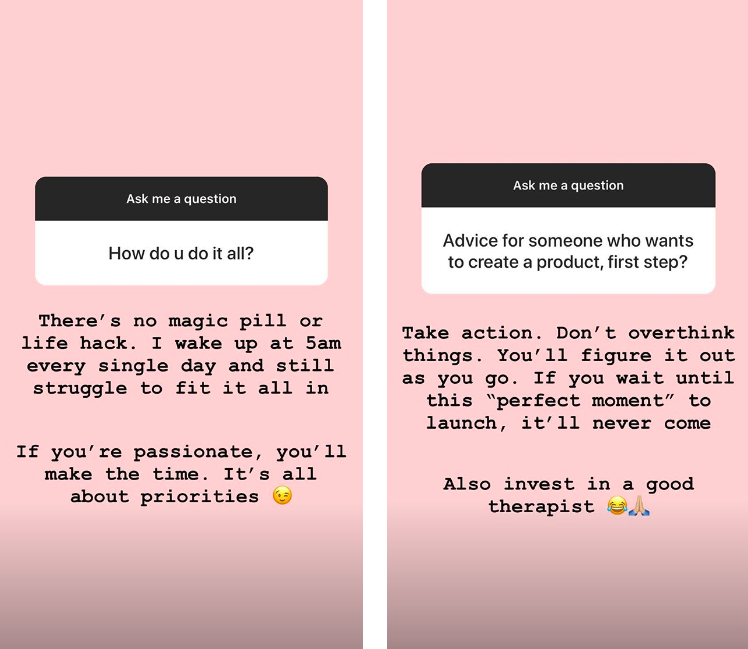
Consider doing something similar when you’re communicating with your customers. Tone down your efforts to appear perfect all the time and be real with the issues you face in your company.
Walk the Talk
You can brag about your values on your website, even paint your mission and vision on the walls of your store, but your marketing will fall flat if you don’t do anything to backup your claims. As the cliche goes, actions speak louder than words. So why not make sure you’re actually doing something to forward your mission and values?
Take a Stand
A brand’s authenticity is put to the test when faced with controversial issues. A company that doesn’t speak up about things that go against its mission or ideas will quickly lose the trust— and business—of their customers.
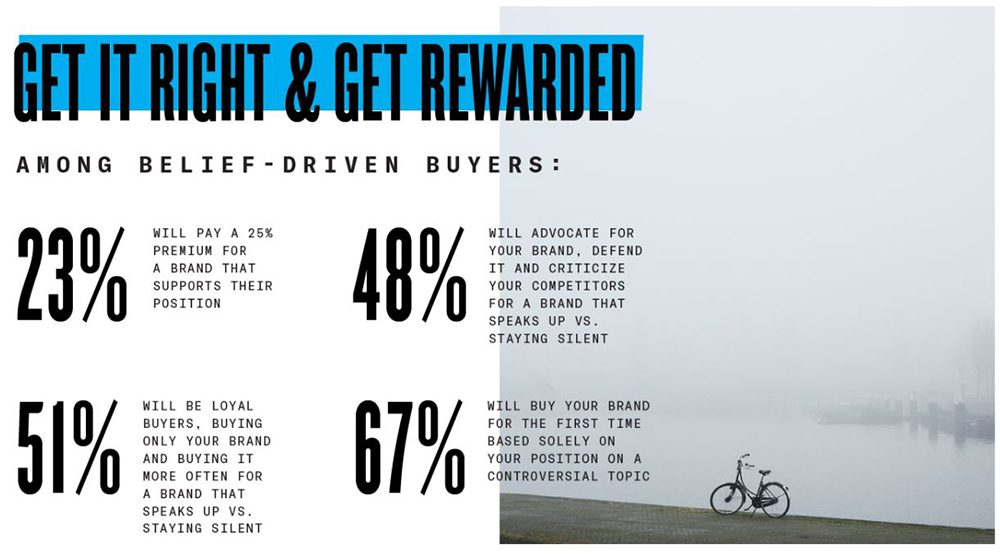
This is particularly today when consumers are increasingly becoming more belief-driven. The 2018 Edelman Earned Brand report found that 64% of shoppers worldwide are belief-driven buyers who base their shopping decisions on a brand’s position on controversial issues.
The good news is, brands are increasingly recognizing this. From Ben & Jerry’s ice cream joining the climate change movement to Nike featuring Colin Kaepernick in one of its ads, we’re seeing more and more brands take a stand on issues.
https://www.instagram.com/p/BnRoVQTlFK9/
If you haven’t done so yet, start taking a more solid stance on topics you genuinely care about. Be vocal. Sign that petition. Publicly commit to taking action. You might ruffle some feathers, but you’ll gain the loyalty of consumers who share your beliefs.
Give Back
Getting behind causes that support your mission is an excellent display of authenticity. It shows that you’re serious about your vision and you aren’t just spewing feel-good platitudes to win people’s business.
Outdoors apparel retail Patagonia is doing just that. Last year, the company announced that it would take the $10 million is saves from the recent administration’s tax cuts and donate the money to environmental groups.
https://www.instagram.com/p/Bqvk53QFlNJ/
This bold move sent the message that Patagonia legitimately cares about the environment and the company received tremendous feedback from its community.
Authenticity Marketing is Here to Stay
As we mentioned earlier, consumers are increasingly becoming belief-driven when making purchases and they’re getting better at discerning insincere and too-good-to-be-true advertising. For these reasons, being more authentic in your marketing is no longer a best practice—it’s a necessity.
Let PowerReviews help in your efforts to be more transparent and authentic marketing professionals. Our content moderation services can help you scale your user-generated content efforts without compromising authenticity and quality.
Learn more and request a demo with PowerReviews today!






